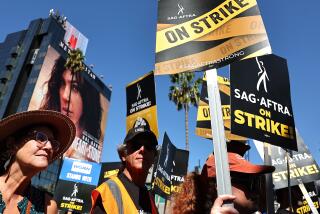Hollywood Writers Try to Strike a Balance
- Share via
Despite the stalled talks between Hollywood studios and writers, leaders of the Writers Guild of America have a message for their members: Don’t assume there’s going to be a strike.
But at the same time they want writers to know they will continue fighting for better residual payments and the right to be paid if their work is distributed in the future via the Internet, demands the studios show little interest in meeting.
The moderate tone, combined with the resolve to continue fighting during talks, is the kind of mixed message Hollywood is getting from both sides these days about where the talks are heading. Tuesday night, it was on display again in the first of several planned “town hall” meetings with rank-and-file writers.
Leaders of the guild repeatedly called last week’s break-off of talks with studios “halftime” and “a breather,” suggesting that negotiations eventually will reconvene before the contract expires at 12:01 a.m. May 2. No new sessions are scheduled, but both sides say talks probably won’t resume until April.
Generally, writers at the meeting voiced support for the guild’s leaders, although some expressed nervousness about a possible strike. One compared a strike scenario to D-day, with the writers being the troops landing on Normandy beaches and the guild’s leaders generals looking on from a distance with binoculars.
Others were more militant, with one saying, “I thought Neville Chamberlain was dead,” after an earlier speaker said the suffering he went through during the 1988 strike wasn’t worth it, suggesting appeasement during negotiations.
Leading the meeting was John Wells, president of the guild’s Western faction that represents Hollywood’s screen and TV writers, and chief negotiator John McLean. Both said there is no reason why a deal can’t be made, especially because the amount of money writers want is relatively small for today’s huge media conglomerates. But they also stressed the need for writers to maintain solidarity.
An estimated 1,000 Writers Guild members attended the meeting at the Universal City Sheraton. At least 10 security guards, six equipped with radios with earplugs, were also on hand.
The scene resembled a busy polling place on election day with long tables set up so that workers could check credentials. Bona fide guild members were asked for their Social Security numbers, then given a green ticket they needed for admission into the ballroom. The interest was so great that by 7:45 p.m.--when the meeting got started--only seven seats remained open. The meeting ended around 11 p.m.
Guild members were instructed not to talk to reporters. Several interviewed, however, said it was too soon to say whether there would be a strike since they expect any breakthrough to come at the eleventh hour. Several said they would support a strike. Others said they were not sure. No one wanted to give his or her name or be quoted on the record.
Outside, the cars writers drove up in--from Range Rovers to economy sedans--said a lot about the vast disparity in incomes these days for Hollywood’s writers.
Writers claim studios have offered a contract package that amounts to a net decrease of $2.7 million in total compensation over three years, in contrast to their demands for a package that would give them a net increase of $99.7 million.
Studios argue that they are offering a package equal to a $30-million increase, while writers are asking for increases totaling $112 million. The main disagreement is over residuals, or the payments writers receive when their work is rerun in such markets as cable, foreign channels or when work is sold on DVD or videocassette.
Writers argue that studios have enjoyed bargain rates to develop those markets, but aren’t sharing the bounty now that they have become lucrative. Studios counter that the cost of making and marketing films and TV shows climbed to staggering levels, which have squeezed profits. They add that whatever increases they give writers, they will be obligated to give actors, directors, musicians and Hollywood’s blue-collar work force.
Guild leaders detailed one key objection--a studio proposal to shave residuals in a little-known area called “double bursts.” That refers to an increasing trend in which shows are rerun within days of their first airing. Walt Disney Co., for example, airs “Once and Again” on ABC and the Lifetime cable channel within days, and “Law & Order: Special Victims Unit” runs on the USA Network shortly after it airs on NBC.
Studios initially proposed eliminating the residuals writers get for that second showing, but later revised it to cut the amount by 75%. The guild is decrying that proposal as a “rollback.”
But studio negotiator Nick Counter said the proposal is aimed at giving networks the incentive to build audiences, which benefits both sides financially. He added that it would apply only to shows that go on the air after May of next year, and the discounted residual would apply only when shows rerun within two weeks.
During the meeting guild negotiator Mike Mahern complained that studio preparations for a strike--stockpiling scripts and accelerating projects--have pushed prices up. As a result, he said, studios are spending inflated amounts on projects, money they could have spent to settle the contract.
He added that the guild is determined to make inroads in the fledgling Internet. Many writers believe the guild needs to gain a foothold in that area in case the distribution of entertainment over the Internet explodes.
“It’s an issue that they are not going to win on,” Wells said. “We’d be undermining our entire future.”
More to Read
The biggest entertainment stories
Get our big stories about Hollywood, film, television, music, arts, culture and more right in your inbox as soon as they publish.
You may occasionally receive promotional content from the Los Angeles Times.











